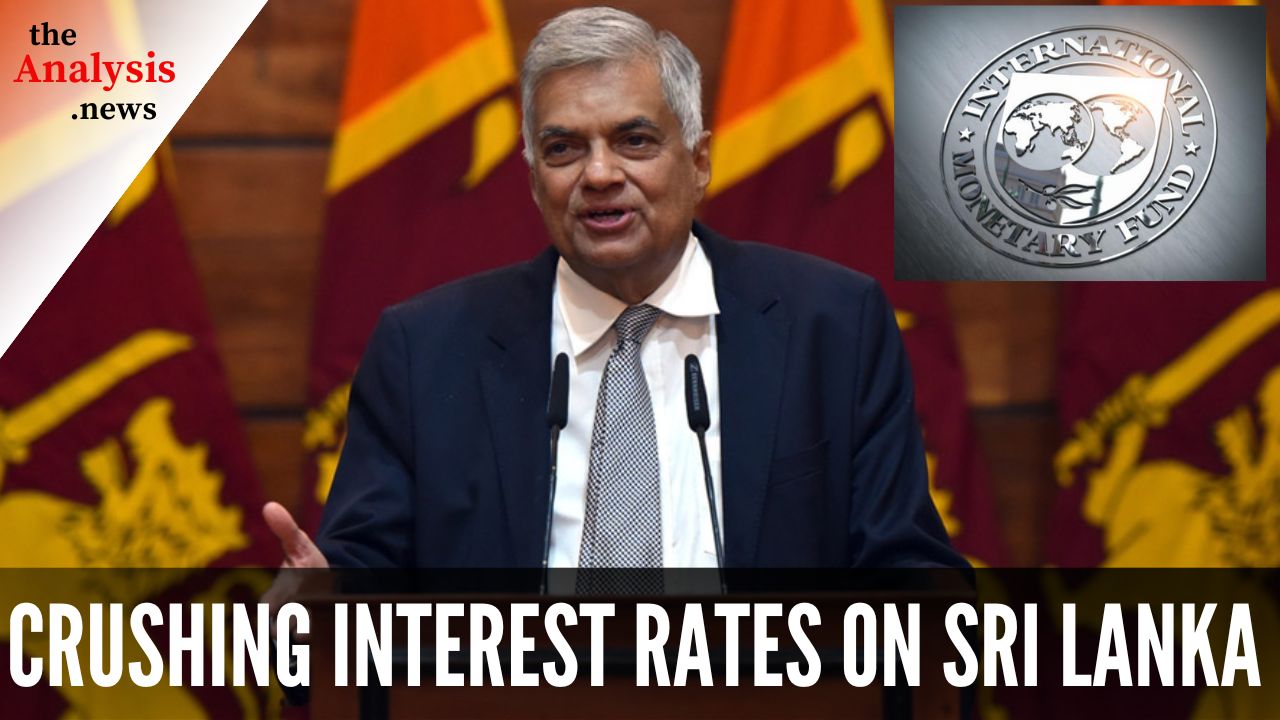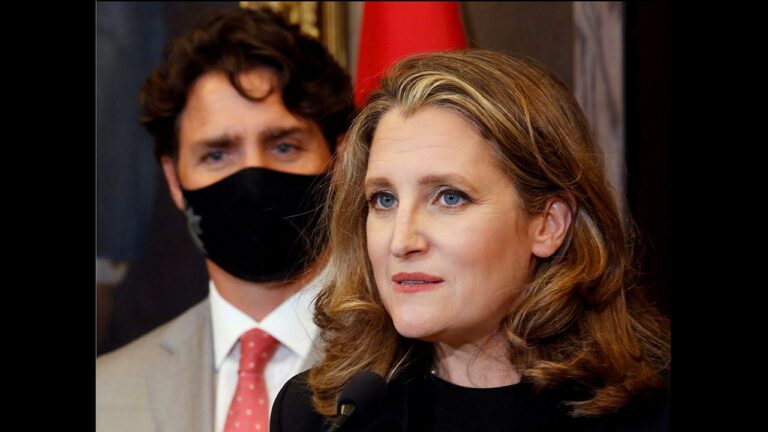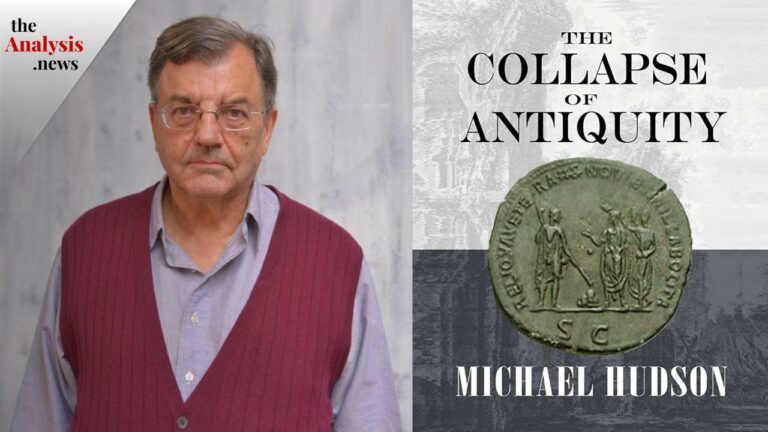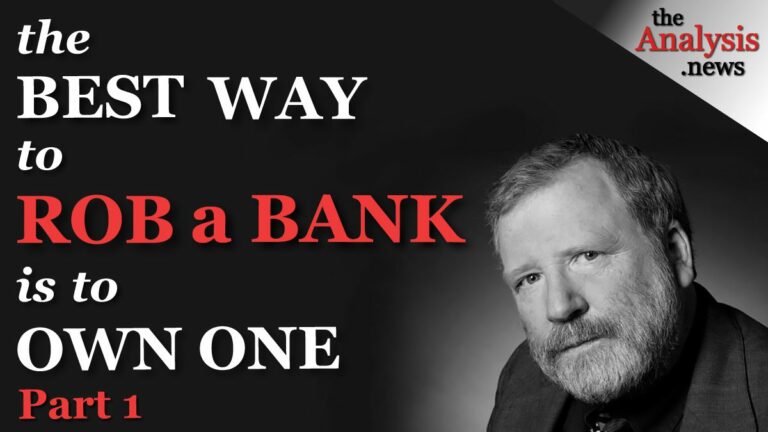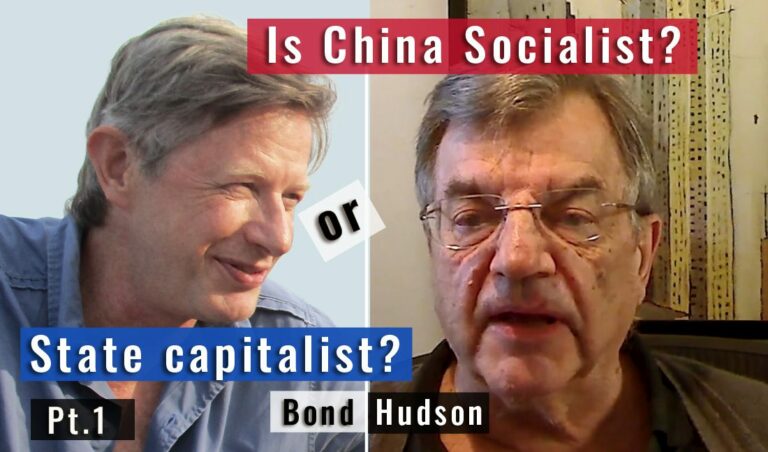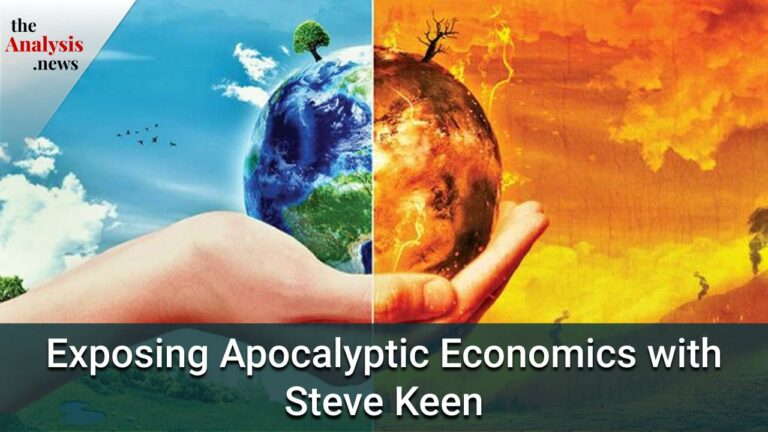IMF & Private Creditors Subject Sri Lanka to Neo-Colonial Debt Bondage – Asoka Bandarage part 1/2
The Sri Lankan government turned to the IMF for a near $3 billion bailout to repay loans provided by India and Japan, as well as international sovereign bonds issued by foreign creditors such as BlackRock. Dr. Asoka Bandarage, sociologist and author of Crisis in Sri Lanka and the World, suggests that Prime Minister Rajapaksa’s declaration of bankruptcy in 2022 and the subsequent IMF bailout under Prime Minister Wickremesinghe was not an absolute necessity, but an attempt to shift Sri Lanka further under the umbrella of Western and Indian institutions, and away from Chinese loans.
Debt and Climate Crisis in Sri Lanka and the World – Asoka Bandarage
Talia Baroncelli
You’re watching theAnalysis.news, and I’m your host, Talia Baroncelli. Today, I’ll be joined by sociologist Dr. Asoka Bandarage. We’ll be speaking about the IMF loan or bailout to Sri Lanka, as well as Sri Lanka’s unmanageable debt burden and the significance of the Bandung Conference, which took place 69 years ago.
We really can’t make this content without you, so if you’d like to support us, feel free to do so by going to our website, theAnalysis.news. Hit the donate button at the top right corner of the screen. Get on to our mailing list and like and subscribe to the show wherever you listen to it, be it on YouTube, Spotify, or Apple. See you in a bit with Dr. Asoka Bandarage.
Joining me now is Dr. Asoka Bandarage. She is an adjunct professor at the California Institute for Integral Studies. She has taught at Brandeis University as well as Mount Holyoke, where she received tenure. She’s the author of a great book called Crisis in Sri Lanka and the World: Colonial and Neoliberal Origins: Ecological and Collective Alternatives. I actually had Dr. Bandarage on this show in August, so feel free to go back to that interview and listen to it as we go into more depth about the different themes that she discusses in her book. Thanks for joining me today, Dr. Bandarage.
Asoka Bandarage
Thank you for having me. It’s nice to be back on your show. Thank you.
Talia Baroncelli
Well, it’s an opportune moment to have you on the show again because 69 years ago, the Bandung Conference was held between April 18 and 24 in Indonesia. It was first suggested by President Sukarno of Indonesia and was organized by Ceylon, which later became Sri Lanka, led by Sir John Kotelawala, and India, Pakistan, Burma, which then became Myanmar. Twenty-nine other nations participated in this Afro-Asian conference comprising over half of the world’s population.
This conference took place at a time when the Cold War was already underway, and several countries were decolonizing and gaining independence from colonial powers. Many of the nations met to discuss principles of neutrality. There were some countries that were opposed to viewing China as a country which they could align with because of China’s Communist Party, and then other countries that were far more critical of the role of the United States.
Given the principles which were agreed to, the Final Communiqué, at the Bandung Conference, and the spirit of Bandung, which then later influenced the Non-Aligned Movement, how would you assess the issues that Sri Lanka is currently experiencing and how its sovereignty has been undermined ever since then?
Asoka Bandarage
I think it’s a very important conference and declaration, the Bandung Conference and declaration, for us to resuscitate because it emerged during the time of decolonization when there was a lot of hope and excitement in the world that the countries that had been colonized by the West for centuries would now be able to come to their own and develop on their own parts of political and economic and even cultural development.
This Bandung Conference, there were 10 principles there, and they pertain to sovereignty of all nations, the equality of all nations, large or small, and the absence of interference by external powers. These are spread out in the 10 principles of the Bandung Conference. I think that these are more important than ever today in the era of neoliberalism and increased external intervention in countries like Sri Lanka.
To look at what’s happening in Sri Lanka, with Sri Lanka becoming a site of a new superpower struggle, the so-called new superpower struggle, and the Cold War, the sovereignty of the nation is at stake. The Bandung principle is very applicable. So is the principle of equality of all nations. If you look at, for example, India’s aggression vis-à-vis Sri Lanka, the size does matter here, whereas the Bandung Conference says that all nations should be treated equally and also the call for non-intervention.
These principles are more important than ever. These principles were further developed with the emergence of the Non-Aligned Movement following the Bandung Conference, the first Non-Aligned Movement, which took place in 1961 in Belgrade, Yugoslavia.
Talia Baroncelli
Well, that’s interesting that you mentioned the principle of not intervening in other countries. If you look at Sukarno, the President of Indonesia’s speech, he was also speaking about the UN Charter, which had been signed, and how this principle of non-intervention was enshrined in the charter. I think there was a bit of maybe a resurgence of colonialism or the threat of Western hegemony and Western imperialism in the early ’50s because there was this change in government as well in the United States.
Roosevelt was a supporter of this non-intervention policy, and successive governments weren’t. I think there was this fear. Sukarno, you mentioned this fear, which was perhaps even more dangerous than the threat itself of intervention, and how this fear needed to be combated and these principles of non-intervention needed to be reinstated because they were so important. Maybe you could speak about the dynamic at the time and countries that were either going through decolonization or gaining their independence, what they feared, and whether they saw perhaps other countries, such as China or the Soviet Union, whether they considered those powers to be potential allies.
Asoka Bandarage
Yeah, it was. The world was conceptually in a polarized way. Countries were either going to be aligned with the West or the Soviet Union, but when, in fact, many of the ex-colonies were not interested in joining either party, where the West interpreted the desire on the part of ex-colonies to go on their own as necessarily joining the Soviet Union, which wasn’t the case. If you look at the different models or economic development that were put forward, whether it was African socialism, Ujamaa in Tanzania, and so on and so forth, they were not necessarily communist parties. They were independent and unique parts of development that these countries were struggling to establish. But it was interpreted as joining the Soviet Bloc. Sri Lanka was a case in point.
In the 1960s and even in the ’70s, Sri Lanka was trying to follow a middle path toward development, which included import substitution, nationalization of foreign-owned companies, and so on and so forth. But it was not necessarily an anticapitalistic or a communist path that was being pursued. I think that applies to many of the other countries as well.
This non-intervention, as far as the ex colonies were concerned, was not just in terms of political and military intervention, but also in terms of economic intervention, the right for self-determination, the right to develop one’s own resources and control resources of those countries. The economic aspect was very important from the very beginning.
Talia Baroncelli
It’s important that you mentioned the economic aspect because in your book, you also refer to neo-colonialism. You say that neo-colonialism refers to the continued economic and financial control of former colonies by imperialist powers without direct political control. We could speak of perhaps the IMF bailout of Sri Lanka as a form of neo-colonialism. I’m sure a lot of other people would disagree, but we could speak about the Bretton Woods system, the IMF, and the World Bank and the very devastating terms that they enact on countries to whom they provide so-called bailouts, the structural adjustment packages that they require from these countries in order to actually give them a loan, which has really, really terribly high interest rates and requires all sorts of privatization, reducing public expenditure, and other destructive policies.
Asoka Bandarage
Yeah, the term neo-colonialism itself, I think, is attributed to Kwame Nkrumah, the first President of Ghana, who really explained that political independence didn’t necessarily guarantee economic independence and that economic policies were still decided outside of those countries by the imperialist powers. If you look at Sri Lanka, it’s interesting to note that the Central Bank of Sri Lanka was established by a U.S. economist, John Exter, who was appointed by the Federal Reserve of the United States. Once he established the Central Bank, he became its first chair or president and then went on to be very much involved in advising the Sri Lankan government, which was at that time called Ceylon.
The U.S. was very much involved in Sri Lanka from the very beginning of independence, as it was in many other parts of the world. At the end of the Second World War, you have a shift of power. Britain and the U.K. are diminishing in their power, and the U.S. is stepping into that role, but not as a direct political power, but more so as an economic power. Of course, the Bretton Woods institutions, the World Bank, and the IMF were very instrumental in upholding the U.S. position, the dominance of the West in the global economy, and the control of the ex-colony.
Talia Baroncelli
I do remember that from our last interview speaking about John Exter from the Federal Reserve and how he had a hand in setting up the Central Bank in Sri Lanka. It’s quite mind-boggling how that was even possible. I think it was at the same time when Secretary of State John Foster Dulles, as well as the ambassador to Sri Lanka or Ceylon at the time, Ambassador Philip K. Crowe, met with Prime Minister Sir John Kotelawala to discuss different political strategies, as well as the $5 million USD aid package for non-agricultural development and cultural assistance.
This was an effort on the part of the U.S. at the time to curb the influence of China as well as the Soviet Union. This is where you see these various tactics that end up playing out on the soil of other countries, impeding their sovereignty or influencing, shaping their sovereignty or lack thereof in order to ensure that other countries or powers such as China and the Soviet Union wouldn’t gain control over what was then Ceylon.
Asoka Bandarage
Yeah. In spite of the prominence of the United States, in the ’60s and ’70s, Sri Lanka, like many other ex-colonies, tried to pursue a more nationalist agenda in terms of economic development and upholding the principles of the Non-Aligned Movement. Though it was a very small country, Sri Lanka played a major role in advancing the Non-Aligned Movement. It’s interesting that the fifth conference of the Non-Aligned Movement was held in Sri Lanka in 1976.
Along with the Non-Aligned Movement, there were also calls for upholding the Indian Ocean region as a region of peace, the demilitarization of the Indian Ocean, protecting it against military intervention, or the use of the establishment of military bases and logistics bases in the Indian Ocean.
Sri Lanka was really moving forward in that direction but then came 1977. Following the elections, there was a dramatic shift towards neoliberalism. Sri Lanka was the first country in Asia to adopt the neoliberalism package full scale. This was after having tried the economic nationalism path. With all its shortcomings, it was nevertheless an attempt to find economic as well as political sovereignty.
Talia Baroncelli
The timing is very interesting. You mentioned that the fifth meeting of the Non-Aligned Movement was in Sri Lanka in 1976. Then, a year later, there was a reshuffling of the deck, the establishment of a regime that was adopting neoliberal policies and was more friendly with the United States. I guess that was not a really good turn or result in terms of the history of Sri Lanka. We can see a lot of the continuation of that policy, those neoliberal policies, in the current unmanageable debt crisis that Sri Lanka has been going through.
In April 2022, under the [Gotabaya] Rajapaksa government, Rajapaksa, the President, no, the Prime Minister, I believe, but feel free to correct me, he announced that the country was facing a sovereign default. The country was essentially going bankrupt. At the time, in April ’22, Sri Lanka only had $1.9 billion in foreign exchange reserves, which was not enough to make an upcoming debt repayment of $4 billion USD.
One thing you go into in your book is how the pandemic, as well as other neoliberal policies, contributed to the exacerbation of this debt crisis. Since Sri Lanka only had a certain amount of foreign exchange reserves and the foreign debt that it held was largely held by private creditors, which had really high interest rates, and also due to inflation, the debt was just becoming increasingly unmanageable, especially with regards to its foreign debt. That’s why Sri Lanka started to negotiate with the IMF to negotiate a bailout.
The IMF and Sri Lanka signed a $2.9 billion or a $3 billion USD bailout. The second tranche of that, the second tranche of $337 million has just been reviewed and approved. Approving the second tranche is based on a lot of conditions being put into place. This is largely contingent on discussions by other creditor nations such as Japan, France, and India. They play a huge role in the Official Creditor Committee, which determines whether Sri Lanka should, in fact, continue to get money from the IMF.
One thing that they suggested, that these creditor nations suggested, was that Sri Lanka signed onto memorandums of understanding with its creditors and that it ensure that they continue to implement privatization of public firms and that there’s a cut to public expenditure and other measures which really impact the socioeconomic status of ordinary Sri Lankans.
Just one final point to illustrate the debt issue. I think in November of last year, there was a report by Reuters illustrating how much debt Sri Lanka was holding. Its external debt is really just through the roof. So $36.6 billion USD, of which $10.94 billion is bilateral debt. A lot of that is actually with China. But China doesn’t hold the majority of Sri Lanka’s debt, and this is something you point to in your book. It’s actually international sovereign bonds given or issued by commercial asset managers measures such as BlackRock, which formed the largest proportion of its external debt, and this comprises $12.5 billion USD. This is really something when you look at Sri Lanka’s external debt.
You were recently in Sri Lanka, what are your thoughts now on how the IMF bailout is going? Do you think that things are improving as a result of the bailout, or would you say it’s the opposite?
Asoka Bandarage
Yeah, going back to what you were saying before, whether Sri Lanka had to default or declare bankruptcy in April 2022 is questionable. There is now a lot of controversial information, and information pointing to the fact that there were bilateral loans available at that time, including from China for something like $2 billion, so Sri Lanka didn’t necessarily have to declare bankruptcy at that point.
Why was there pressure placed on the Sri Lankan government to do so, and why was that the case? Perhaps we may never know the complete answer, but there is some evidence and concern that it may have been to move Sri Lanka away from dependence on China to credit lines of the IMF, the West, and India. Again, the economic crisis and the default itself were part of a political shift that was envisioned in terms of the geopolitical strategic balance, moving it away from China to the West. I think it’s important to bear that in mind.
Looking at the impact of the IMF bailout, now, the official stance on the part of the Sri Lankan government, the IMF, and some other international institutions, including NGOs, is that the restructuring is going well, that Sri Lanka is upholding the conditions that are required, and the economy is on the mend. On some levels, it seems that there is normalcy that didn’t exist during the crisis when there were long queues, people standing in line to gather fuel and, food shortages, so on and so forth. But the conditions have been very harsh, and they are mostly borne by the poorest communities.
In order to increase state revenue and cut back on state expenditures, there have been increasing tariffs, for example, electricity tariffs, which have been very hard on the poorest segments of the population. So much so that over the last many months, over a million people have lost access to electricity, which means that children are not able to study at night. There is no electricity. Medium and small-scale businesses are not able to function because they don’t have power. It’s even affected the hospitals and some vital institutions. That’s really a universal burden falling mostly on the poorest segments. So is the tax called a value-added tax VAT of 18% that has been applied to all manner of goods and services, including some essential goods and services, which again falls most heavily on the poorest segments of the population. Also, cutbacks in state subsidies like fertilizer and some benefits for the agricultural sector have really weakened agricultural production.
There has been a downturn in the economy, loss of employment, and lots of people leaving the country, particularly youth and professional groups. There’s a massive brain drain. Over a million people have left the country since the crisis. It’s out of desperation that people are leaving the country. Sometimes, for very questionable enterprises, for example, those who are going to fight in the Ukraine war on both sides of the war, the Russian and the Ukrainian sides, because of the money that they can get, essentially by providing mercenary services.
Also the long term, what happens to the country when the educated, professional, skilled laborers leave the country in such large numbers? In some hospitals, there are no anesthesiologists. Lots of doctors, engineers, and others are leaving the country. Is that really an economy on the right path? Then, of course, the privatization of security sectors, telecommunications, and energy, raises a whole lot of questions about who’s buying these enterprises, and if they’re falling into external hands, doesn’t the country lose its control over its security, its economic and political sovereignty?
Talia Baroncelli
The tax issue is a big issue. If I recall correctly, for the five years that Rajapaksa was in power, he was cutting taxes primarily to the wealthier segments of the population. The Sri Lankan government wasn’t actually earning enough money from… it wasn’t getting enough tax revenue. The fact that it’s perhaps increasing the burden on an average ordinary person through value-added tax means that it’s making it harder for ordinary people to make a living and get by. It’s collecting taxes that way rather than increasing taxes on the wealthier segments of society, which doesn’t seem like the right way to go.
Asoka Bandarage
Yeah. Another aspect of this is all the money that the political and economic elite is stashing abroad in foreign banks. It’s often referred to as the misinvoicing plunder; that is, exporters and importers either not reporting their income and expenditures correctly and holding that money abroad, which is foreign exchange in USD that, if brought to the country, and I have figures of this in my book, if brought to the country, the country would have the foreign exchange to pay back much of the debt or even most of it. This misinvoicing plunder, again, is not peculiar to Sri Lanka. This is, unfortunately, a common characteristic in many other countries, including many other countries that are debt-ridden or near debt crisis policies. Although the IMF is talking about good governance, they have not tried to introduce stipulations in terms of reverting this money back to the country.
Talia Baroncelli
You’ve just been watching part one of my discussion with Dr. Asoka Bandarage. Join us for part two, where we’ll be discussing the ecological crises in Sri Lanka. Thanks for watching, and see you then.
Podcast: Play in new window | Download
Asoka Bandarage has taught at Yale, Brandeis, Mount Holyoke, Georgetown, American, and other universities and colleges in the U.S. and abroad. Her research interests include social philosophy and consciousness, environmental sustainability, human well-being and health, global political economy, ethnicity, gender, population, social movements, and South Asia.
